- Home
- W. Bruce Cameron
Emory's Gift Page 19
Emory's Gift Read online
Page 19
“You have to run away,” I told him. “It’s worse than last time. A judge said the police can come out and shoot you. You have to go far, far away, up into the mountains. Okay?” I wiped a tear away from my eye. It was so unfair. Seeing Emory’s blank expression made me want to fall to my knees and wail. Why did things like this keep happening to me? I made a shooing motion with my arms. “Emory. Go.”
Instead of leaving, Emory went over and sniffed at the big metal can that now held his dog food. I had to laugh at the absurdity of it. Here I was terrified for his life and Emory’s main concern was that he wanted to eat.
The thing was, he could have knocked that trash can over and popped that lid off any time he wanted, but he waited for me to use a scoop to fill the big pan. It was like me being in charge of my own grounding—we could trust Emory; didn’t that prove something?
“We have time. He should probably eat,” my father told me.
So I poured the food into the pan and as Emory bent his head to feed I ran my hands up and down the thick, coarse fur on his shoulders. It was, I realized, the last time I would ever see my friend the bear. I kept sniffing back the tears—it helped that Emory didn’t seem too upset, just mainly hungry, as always.
When he was done and he’d lapped up enough water to put out a small fire, Emory lumbered out into the yard. I shut both doors to the pole barn with a bang, illustrating my point.
“Now go, Emory. Go away.”
With one final, impenetrable look, Emory went. As he descended the trail to the creek where the shadows had gathered to wait for nightfall, he never once looked over his shoulder at me. Didn’t I mean enough to him for a farewell glance of any kind? I stood at the edge of the yard and watched his retreating back until the gloom swallowed him up.
We were having dinner when the Fish and Game cars showed up. As my dad was raising a bite of food to his mouth his face lit up with red, pulsing flashes from the cherry lights. Mr. Hessler had his two buddies back, and they had their rifles at the ready, plus there were two sheriff’s deputies with heavy shotguns.
“Stay here,” my dad ordered me.
I stood in the front window to watch. I saw my dad have a brief conversation with Mr. Hessler and then walk over to the pole barn, the men with the guns on high alert. When my dad raised the door the men all flinched. The inside was well lit with headlights and clearly there was no sign of Emory, but Mr. Hessler still made a show of looking around, his team following him in silly, creeping steps, as if they expected the bear to jump out of one of the freezers.
My dad waited until the cars pulled out of the driveway before returning to finish his meal.
“He said his boss might make him come back in a day or two, but I told him the bear ran off to the mountains, and he seemed pretty satisfied with that.”
“Thanks, Dad,” I said, meaning “thanks for everything.”
“It’s okay,” my dad told me, smiling.
I was happy Emory was safe, but it was like giving away a dog—he was my friend. I crawled into bed worrying about him, hoping he was already miles away and looking for a den to hibernate way up where nobody would find him, but aching at the idea of him being all alone with no friends to comfort him.
And me, I felt alone, too. I pressed my face into the pillow until it was wet with tears, a familiar sensation.
I awoke with a start just before dawn. The light was gray-blue through my window, with a red flush building up strength in the east. Something had awakened me, some sound that shouldn’t have been there.
I strained to hear it, willing the noise to repeat, and when it did it was slightly louder. A high, shrill baying sound. I knew instantly what it was.
McHenry’s hounds.
chapter
TWENTY-FIVE
I KNEW that the hounds meant Emory was close by. He hadn’t run far enough away. McHenry was on his trail. McHenry, who probably had someone on the payroll who called him the second the judge handed down her decision. McHenry, who didn’t care that grizzlies were essentially extinct in Idaho. I had never despised anyone the way I despised McHenry.
I got out of bed and into my clothes as quickly as I could and ran down the hall. I pushed open my dad’s door and fumbled quietly for the key to the gun cabinet.
It was gone. Though it had been less than twenty-four hours since my confession, my dad had already relocated the key, as if, I thought furiously, his guns had been the point of the story!
There was no time to try to find the key. My father slumbered under his covers, oblivious to the buglelike barking and baying from the woods. I went into the living room, wrapped a towel around my fist, and punched the glass in the gun cabinet. It shattered with a racket that sounded all the louder because of the morning quiet.
“Charlie?” my dad called as I pulled out the .30-06 and slipped a box of shells in my pocket. I felt the vibration through the floor as he jumped out of bed, but I was already at the back door. “Charlie!” he shouted, but I was running.
The gathering dawn lent a surreal glow to the path beneath me as I ran. I knew with absolute certainty where Emory was, where the dogs would find him. The old, abandoned hut.
The forest still clutched the night to itself, each tree trunk barely visible in the gloom. The climb was far steeper than the cross-country course, and I faltered, slowing, hating my body for failing me.
The rocky crest made for slow going, but once I was at the top I was out in the sunlight, actually above the Old Cabin, with a full view of the river and of McHenry and his hounds. I deliberately didn’t look behind me, for fear I’d see my father on the balcony of our deck, ordering me with hand signals to get home. The Old Cabin was visible, too, its mossy roof covered with a light frost.
Down in the river valley the dogs were thirty yards ahead of McHenry and pulling away fast, hitting the river with separate splashes. A man could pick his way across all the deadfalls and not get wet, but the canines scrabbled without plan, the current adding drift to their progress, their nails unable to find purchase on the slippery tree trunks, which they gripped with their forelimbs, dangling, before dropping back into the water. Under any other circumstance it would have been comical.
I didn’t see Emory at first. The door to the Old Cabin was open, and I measured the distance from the top of the sandy riverbank to that door, considering. It was at least thirty yards. I swung my gun up. Could I pick off four dogs as they crossed that gap? They’d be slow and probably exhausted from fighting their way up that steep bank.
I peered through the telescopic sight. The dogs were digging their way up the riverbank now, weighed down by the heavy sand, struggling but tantalized by bear scent.
Of course, if Emory wanted to get away from the hounds, he could find himself a tree. That was the point, anyway—bear hunters didn’t want their dogs tussling with a bear, just terrorizing their prey until it treed itself. The real threat came from McHenry, who had gained a few yards on his dogs while they thrashed around in the river; he held a large hunting rifle under his arm as he jumped from log to log, nearly across the rushing waters.
Could I shoot McHenry?
I was pondering this when I saw Emory move. He’d been standing in the trees, absolutely motionless, invisible in the weak morning light. He was watching the dogs approach, but now that they were most of the way up the steep bank he turned and headed for the Old Cabin, not running, calm as you please. Didn’t he understand what was happening?
I stood up and began making my way down. Emory disappeared inside the hut’s front door. A second later, the dogs surged up over the lip of the bank. They were so tired they barely managed to bay, but that didn’t stop them from charging after the bear.
I watched in utter dismay as they streaked across the flat grass toward the cabin. I would never have been able to hit a single one; it was worthless to raise my rifle now. All I could do was watch as they launched themselves over the threshold into the Old Cabin.
The second the last one had
leaped through the open door, Emory came whipping around the corner of the hut, moving faster than any animal I’d ever seen. He must have climbed out the big back window and run around to the front of the building. He lunged for the front door and banged it shut. The dogs were now locked inside.
Immediately the tenor of the dogs’ barking changed; it became muffled and more distant sounding even as their distress pitched their tones higher. Emory eased himself back around the corner of the hut until he was once more hidden from view.
I kept walking, but more slowly, fascinated by what I had just seen. The rear window of the cabin was far too high for the dogs to leap through. They were trapped inside until McHenry arrived to let them out. Emory hadn’t yet done any running and could put a huge distance between himself and his pursuer while McHenry tried to figure out what had happened and got that sticky door reopened.
The man himself was just clearing the sandy bank and looked much the worse for wear, his ribs cranking like bellows and his face red, his mouth slack. He raised his rifle, though, visibly turning off the safety, his instincts telling him there was something wrong with this picture.
I squatted down in the brush so a chance glance wouldn’t find me. Go, Emory. Go, I thought to myself. I hoped he was already a hundred yards away.
McHenry cautiously approached the Old Cabin. “Hello?” he called out. Though it was clear that no one lived in the place, it wasn’t clear there couldn’t be someone hiding inside holding McHenry’s dogs hostage. He looked baffled, but he was taking no chances, his rifle held like a soldier, off his shoulder but at the ready.
He looked to his left and there was a blur to his right and he spun and Emory was right there. McHenry fired a single wild shot and then the bear was upon him, knocking him to the ground. He fell on his back and started to kick himself away, but Emory put his paws on McHenry’s shoulders and he was forced to lie still.
All of this happened in an instant. I abandoned my crouch and ran down the hill, now, slipping and stumbling in my haste, my own rifle held away from my body so if I fell it would land clear.
Emory laid bare his teeth and let loose with a thunderous roar so loud and fierce that the dogs inside the cabin momentarily fell silent. His fangs were just inches from McHenry’s face.
The man looked up, facing his own death, the terror draining all the color from his skin. I stepped out of the trees as the dogs started howling again, and that’s when I saw that Emory was bleeding.
The bear’s shoulder fur was sodden with blood and a trickle of it went down his foreleg in a steady pulse. McHenry had shot him; he had shot Emory. Emory gave vent to another roar, loud as a jet plane, and now I could hear the pain in it, the pain and the rage. And I, too, became enraged, and it overcame me like a fever. I fumbled for the box of shells in my pocket, still walking forward. When I jacked a shell into the chamber, Emory looked up.
Could I shoot McHenry? Yes, yes, I could. A black hate was flooding through me, an unrestrained fury at everything that had happened in my life, the injustice of losing my mom, the unfairness of the courts, my lonely, awful life, and now seeing Emory get shot. I could shoot McHenry.
“You shot my bear, McHenry,” I hissed, my voice actually quivering with wrath. I stepped forward so that he could see me. McHenry’s eyes were filled with a wild light, his face a milky pale, his chin trembling. We locked stares and his look was beseeching, hopeful. I knew my expression was as pitiless as my heart. “You shot my bear, and now I’m going to shoot you, McHenry. I’m going to shoot you dead.”
I was thrilled to say it. I wanted to rampage; I wanted to kill him and beat his body. I’ve never felt such a berserk anger, such an out-of-control bloodlust. I pointed the gun at his face and lowered the barrel until it was just inches from his nose.
Emory stopped me. He lifted his paw and pushed the gun away. “No,” I cried, attempting to aim, and this time the bear released McHenry and knocked the rifle out of my hands.
Hot tears gushed from me as the fever passed. I felt giddy and sick now, and without thinking I plunged my face into Emory’s coarse fur, hugging him and, after a moment, feeling him hug me back.
I recovered with a flash of fear when it occurred to me that McHenry was now free to grab his own rifle, which was lying just a few feet away. I broke from Emory’s embrace and looked to the hunter, but I needn’t have worried. He was still lying there in the same paralyzed position, his eyes wide with shock, beyond terror, beyond comprehension. I bent over and picked up his gun, my hands shaking from the aftereffects of what I’d almost done.
“I’ll keep this for you, but I’m not stealing it. I’m no thief,” I spat. “Don’t let your dogs out until we’re long gone. Understand what I’m saying?”
He nodded, his face still a sickly white.
“Come on, Emory,” I said. As we turned away and headed back toward home, I tried to act as if I weren’t fighting a rising panic.
Emory had been shot. I had no idea what we were going to do now.
chapter
TWENTY-SIX
WHEN Emory and I reached the top of the rocky ridge, I glanced back at McHenry, and he was still lying there, looking like he might never recover from having a grizzly bear’s teeth just inches from his throat.
Good.
If Emory was limping at all, I couldn’t tell, but he was still bleeding from his shoulder. He followed me docilely, and again the unfairness of it all embittered me. Why couldn’t people just leave things alone? We hadn’t been hurting anybody.
My dad was waiting for me on the back deck. His face looked tired.
“Emory’s been shot!” I shouted at him. I went straight to the pole barn, as if physically avoiding my dad’s wrath would be possible. Emory strode over to the couch and eased himself down on it. My dad came up from behind me.
“Give me my rifle, Son,” he said quietly.
I snapped the bolt back and released the shell, then handed him the weapon butt first, barrel down. He nodded at the other one.
“Where did you get that?”
I told him what had happened with McHenry and the dogs at the Old Cabin. My father listened without expression at first, but he grew contemplative when I explained that Emory had pushed the rifle away when I pointed it at the man lying on the ground. I didn’t tell my father about the nearly demonic rage that had infused my blood with a lust for murder, but I think he concluded something like that must have happened.
“What you did was just about the most stupid thing possible. You could have been killed. You could have shot a man. You broke into my gun cabinet when you expressly knew I had locked you out of it, locked you out for what turns out to be a very good reason. You must never disobey me again like that, understand? We said we were in this together, but Charlie, you violated that pact, Son.”
All of this was true and all of this could have been said with a hot anger, a cold fury, or even physical blows, and it would have been justified. But there was something almost gentle in the way my father pronounced his words that made me feel that there was a different meaning to it all.
Later, as I was thinking it over, it occurred to me that there was an unstated possibility at work in this whole injustice. If the words on the barn wall had, in fact, been written by Emory and if he was, in fact, a Civil War soldier somehow returned in the form of a living grizzly bear, then what McHenry had been up to was nothing less onerous than hunting a man down with a pack of dogs and then shooting him out of a tree, murdering him in cold blood. Not a bear, a man.
And though he was not by any means helpless, Emory couldn’t hold a rifle, couldn’t fight back. I had done wrong, but it had been in the name of defending something we might not understand but which had the potential of being innocent human life. So Dad needed to work it all out in his mind, and he wasn’t there yet. It was wrong to disobey, but was it really wrong to disobey when it meant saving a man’s life?
As I said, all of this came to me later. Right then I was fixated on
the fact that Emory was bleeding. We couldn’t really see the wound through the fur, though he allowed my father and me to lean in and peer at it. It would not heal without help.
My dad departed in the Jeep to go get the vet. He left me there to keep Emory company, though I suspect that he also didn’t want me along to see what sort of tale he told the veterinarian to convince him to return with his large-animal surgical bag. Later, when I asked my dad about it, he flushed and said that he may have given the impression that the emergency concerned a horse, though he never said so directly.
“You’ll be okay, Emory,” I said, hoping it was true. Emory gazed back at me with oddly serene eyes. Maybe I was imagining it, but I suddenly had the impression that he knew more about what was going on than any of us.
Several hours passed while we waited for the vet. Outside, the clanking and rattling of the school bus on its way to Benny H. sounded like a long-distance call from another time zone, a faint reminder that far, far from here I had another life. During all that time, Emory just sat there, not crying or panting or anything despite his wound. I was the one who felt like crying, frankly—when I thought back to what happened at the Old Cabin, where I’d been ready to shoot McHenry, I felt like I was going to throw up. What if I had actually done it?
The vet was Tim Humphrey’s father. His name was Jim, and I believe that in the family there was also a sister named Kim and for all I knew a dog named Pim. Dr. Jim Humphrey had Tim’s blond hair and blue eyes and muscular frame, and gave me a toothy grin as he was getting out of the Jeep.
The smile went away when he saw what was in our pole barn.
“My God!” he exclaimed. At first he stood stock-still, staring at Emory lying there on the couch, and then he retreated, stumbling over his own feet. He yanked open the passenger door of the Jeep and jumped in, slamming the door behind him as if the canvas roof of the vehicle couldn’t be shredded by a grizzly bear.
“You said … you said…,” Dr. Humphrey stammered through the open car window.

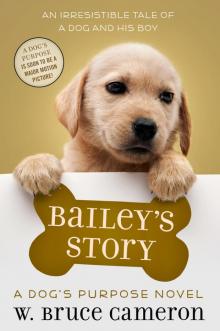 Bailey's Story: A Dog's Purpose Novel
Bailey's Story: A Dog's Purpose Novel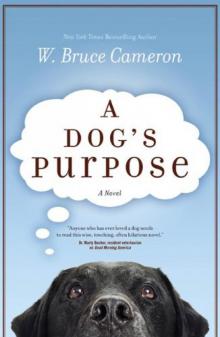 A Dog's Purpose
A Dog's Purpose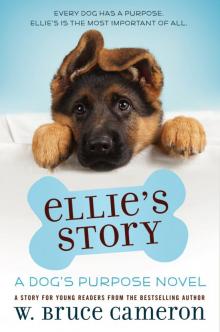 Ellie's Story
Ellie's Story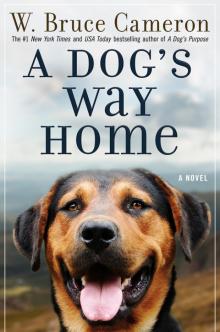 A Dog's Way Home
A Dog's Way Home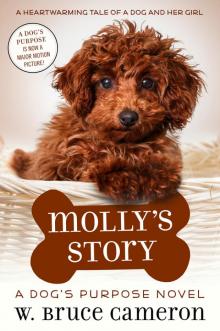 Molly's Story
Molly's Story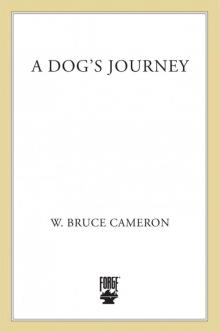 A Dog's Journey
A Dog's Journey The Dogs of Christmas
The Dogs of Christmas A Dog's Perfect Christmas
A Dog's Perfect Christmas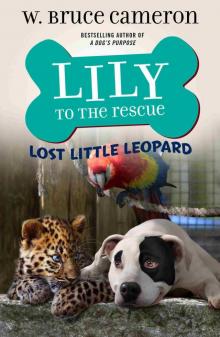 Lily to the Rescue: Lost Little Leopard
Lily to the Rescue: Lost Little Leopard Bella's Story
Bella's Story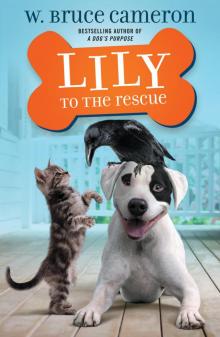 Lily to the Rescue
Lily to the Rescue Lily to the Rescue: The Not-So-Stinky Skunk
Lily to the Rescue: The Not-So-Stinky Skunk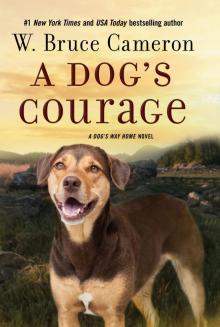 A Dog's Courage--A Dog's Way Home Novel
A Dog's Courage--A Dog's Way Home Novel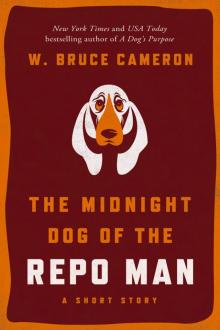 The Midnight Dog of the Repo Man
The Midnight Dog of the Repo Man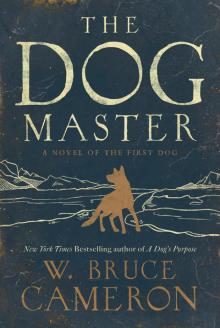 The Dog Master: A Novel of the First Dog
The Dog Master: A Novel of the First Dog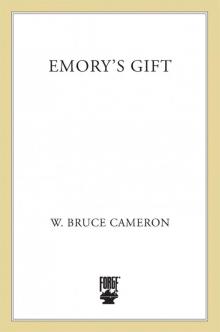 Emory's Gift
Emory's Gift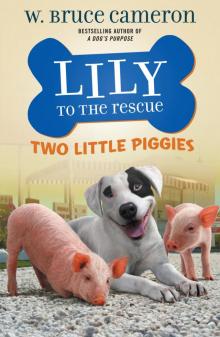 Lily to the Rescue: Two Little Piggies
Lily to the Rescue: Two Little Piggies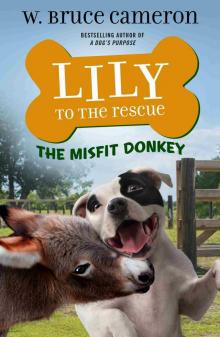 Lily to the Rescue: The Misfit Donkey
Lily to the Rescue: The Misfit Donkey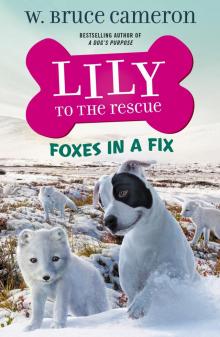 Lily to the Rescue: Foxes in a Fix
Lily to the Rescue: Foxes in a Fix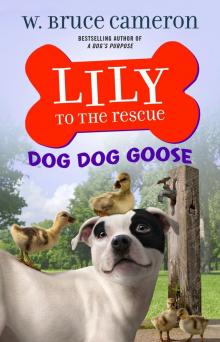 Lily to the Rescue: Dog Dog Goose
Lily to the Rescue: Dog Dog Goose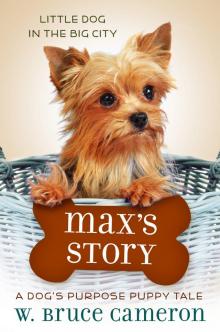 Max's Story
Max's Story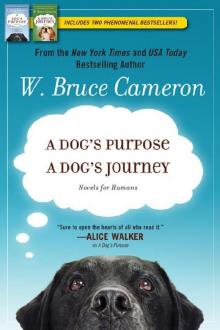 A Dog's Purpose Boxed Set
A Dog's Purpose Boxed Set Toby's Story
Toby's Story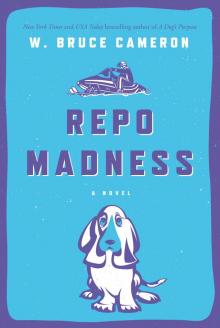 Repo Madness
Repo Madness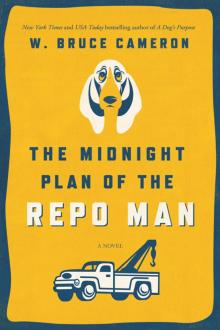 The Midnight Plan of the Repo Man
The Midnight Plan of the Repo Man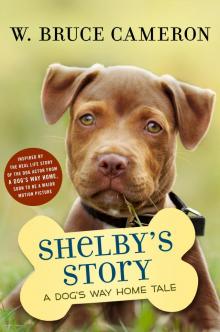 Shelby's Story
Shelby's Story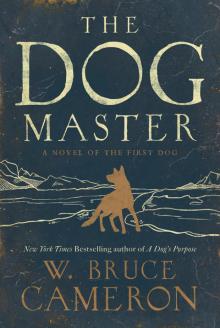 The Dog Master
The Dog Master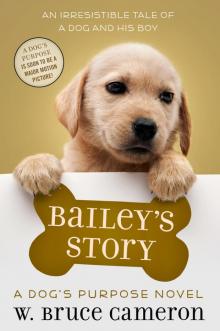 Bailey's Story
Bailey's Story